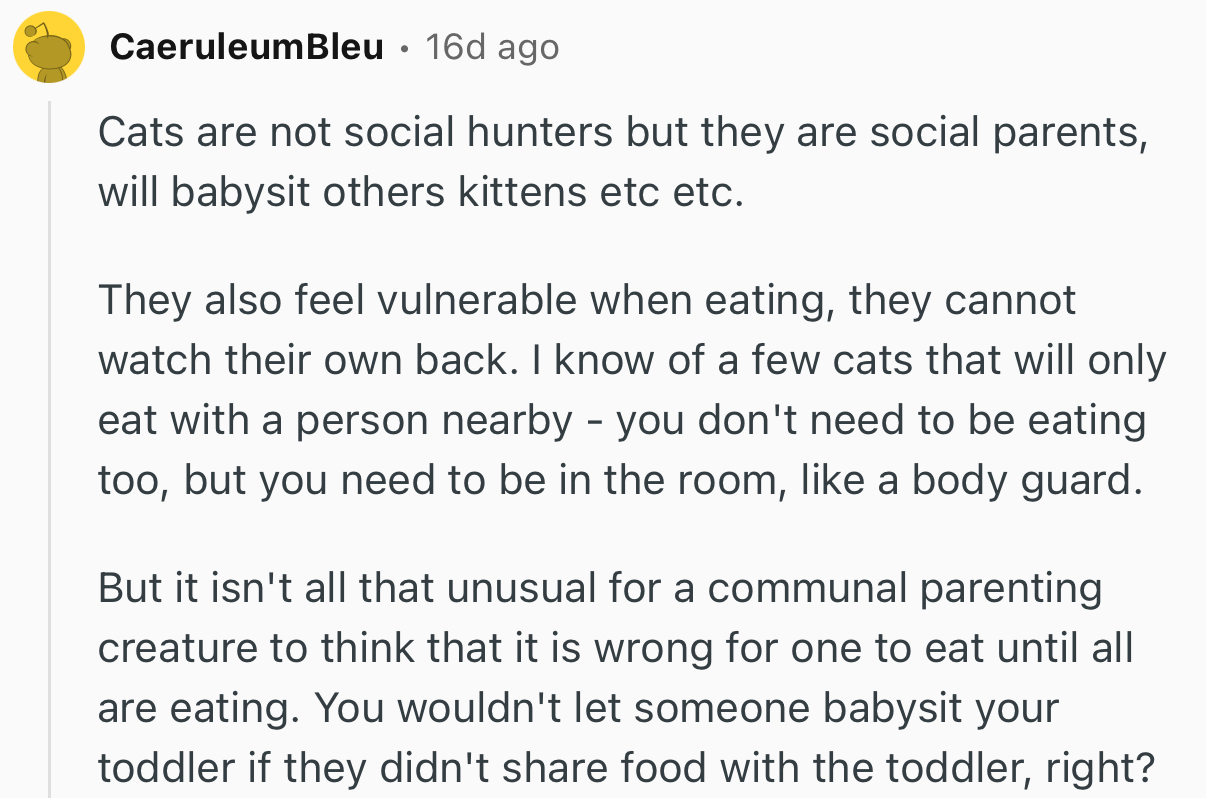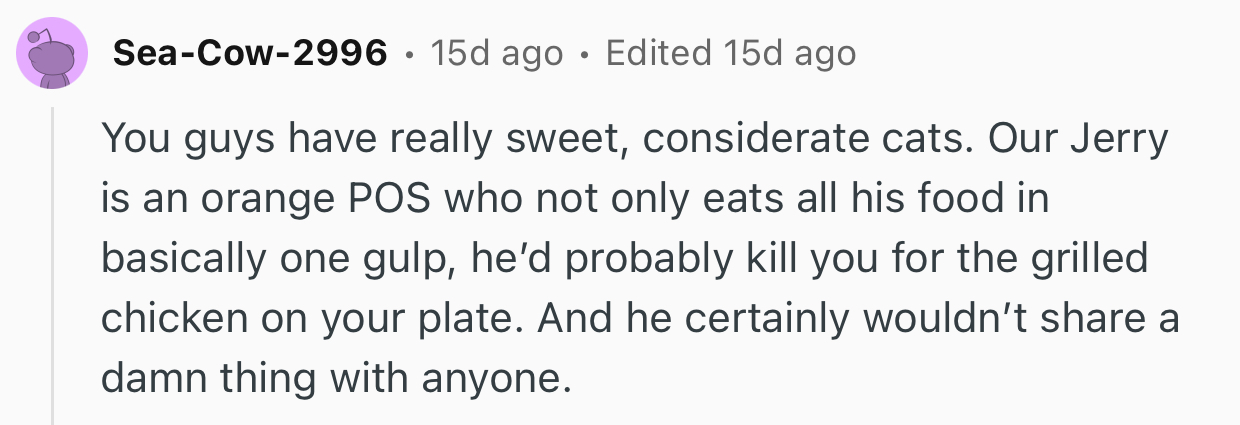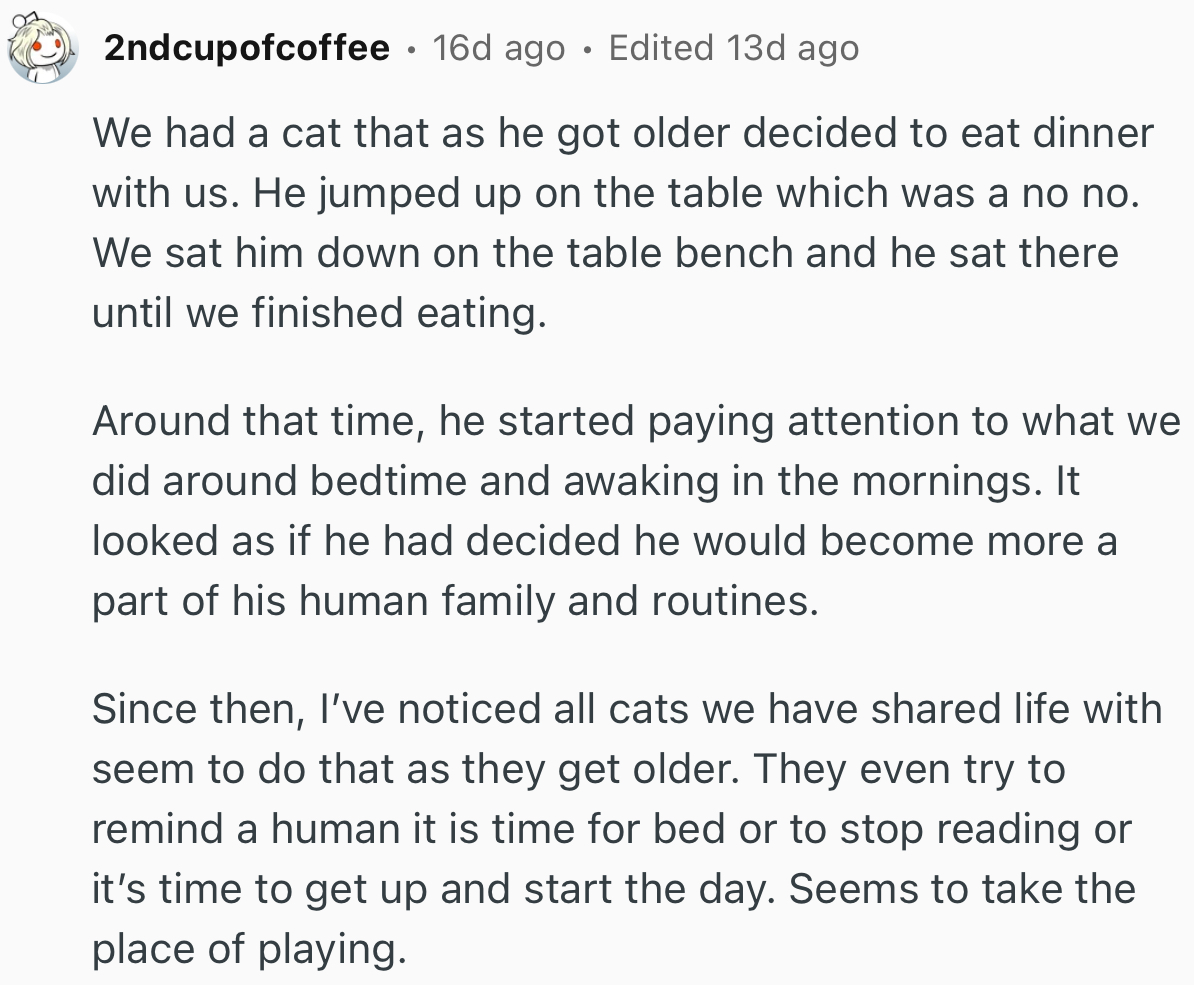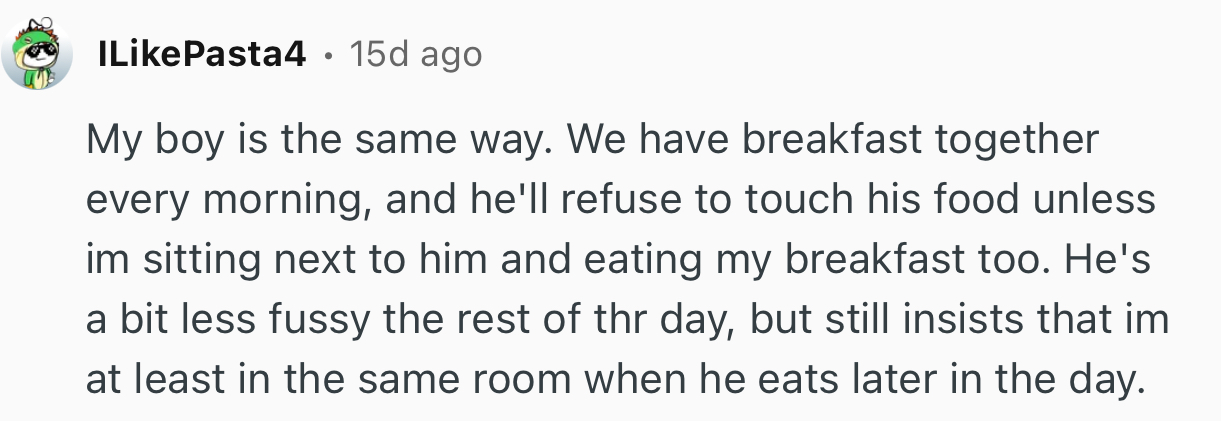Kitten’s Adorable Dinner Habit Means He Waits For The Entire Family To Sit Down At The Table Before Eating
In a recent pet community post, a cat owner (OP) shared something adorable about their kitten’s unexpected eating habits.
They’ve had plenty of cats over the years and developed a feeding strategy that usually works: fill the bowl right before cooking so the cat stays occupied with its own meal instead of begging for scraps from the kitchen.
Simple, practical, and effective, it has worked with most cats they’ve owned.
However, their kitten Opie, whom they got several months ago, isn’t following the script. He’s decided that dinner is apparently a family affair.
No matter how hungry he is or how full his bowl sits, he won’t eat until his owners finish cooking and actually sit down at the table.
He’ll hold out for up to an hour, clearly hungry but stubbornly refusing his food until the family gathers.
It’s as if he’s made a conscious decision that mealtime only counts if everyone’s doing it together.
The owner (OP) isn’t concerned about it; they’re just curious whether this behavior is normal for cats or if Opie is just being uniquely Opie.
It’s the kind of quirky pet behavior that makes you wonder what goes on in their heads.
You’re curious whether there’s some deeper reason behind it or if it’s just pure coincidence and habit.
Check out the full story below.
Let's Dig Into The Details

OP is a big-time cat lover, and they’ve had many cats over the years. Recently, they added a kitten (Opie) to that list

Interestingly, this cat has a habit of not touching its food until OP is done cooking and has sat down to eat their own meal

Family Dynamics and Pet Behavior
Dr. John Bradshaw, an expert in feline behavior, explains that cats are social creatures, often forming strong bonds with their human families. His research highlights how a kitten’s behavior, like waiting for family members to gather before eating, may stem from their instinctual need for social interaction and security.
Dr. Bradshaw emphasizes that this behavior can enhance the emotional bond between pets and owners, reinforcing a sense of community in the household.
Understanding these dynamics can lead to enriched relationships with pets, suggesting that families should prioritize shared moments during feeding times for both pets and people.
Encouraging Healthy Eating Habits
To cultivate healthy eating habits in pets, veterinary nutritionists recommend implementing a structured feeding routine. Dr. Lisa Freeman, a veterinary nutrition expert, suggests that these routines can help regulate pets' metabolism and encourage good eating behaviors.
For families with kittens like Opie, creating a designated meal time that coincides with family meals can help meet both pet and family needs. This approach not only enhances the pet's social experience but also encourages responsible feeding habits, benefiting the overall health of the kitten.
We Gathered Some Of The Most Interesting Comments From Netizens

“Cats Are Naturally Community Feeders.”

“It Isn't All That Unusual For A Communal Parenting Creature To Think That It Is Wrong For One To Eat Until All Are Eating.”

Observation of mealtime habits can reveal much about a pet's personality and social needs. A veterinary behaviorist notes that a kitten's tendency to wait for family members before eating is indicative of a well-adjusted animal, as it seeks social confirmation.
Such behavior can be encouraged by maintaining regular meal times that coincide with family meals, fostering a communal environment. Regular mealtimes can help build a sense of routine and security for pets, ultimately leading to a more harmonious household.
It Seems This Behavior Has Been Observed By A Couple Of Netizens As Well

Not Everyone’s Cat Is “Sweet And Considerate.” Jerry Doesn’t Care About Anything Else Except His Belly

“We Had A Cat That, As He Got Older, Decided To Eat Dinner With Us.”

The Importance of Routine
Dr. Barbara Fredrickson, a leading researcher in positive psychology, emphasizes the benefits of routine in fostering healthy relationships and emotional well-being. She suggests that predictable patterns, such as shared mealtimes, can enhance bonding not just with pets but also within families.
Creating a structured feeding schedule for pets can help reduce anxiety and foster a sense of safety. This approach allows both pets and humans to enjoy shared experiences, enriching their connections and improving overall household dynamics.
“If We Feed The Cat And Go Out, He Will Not Eat His Dinner Until We Get Home.”

“Cats Like To Have A Friend Stand Guard So They Feel Safe From Predators.”

“Totally Normal. Some Cats Are Social Eaters And Wait For The Pride To Eat.”

Experts in animal behavior highlight that a cat's reluctance to eat alone may stem from its ancestral roots as a social hunter. Dr. Jackson Galaxy, a renowned cat behaviorist, suggests that understanding these instincts can help owners create a more nurturing environment.
Galaxy recommends owners engage with their pets during feeding times, perhaps by sitting nearby or even eating together in the same space. This practice reinforces the idea of family and safety, ultimately leading to a more relaxed and healthy pet.
“Lol, Cats Are Weird. My Old Cat Somehow Learned To Tell Time On A Big Clock We Had On The Wall.”

Cats can definitely develop feeding preferences and routines, and some do seem to enjoy eating around their humans.
Whether Opie actually understands the concept of “family mealtime” or has just learned through repetition that eating happens after his owners sit down is hard to say.
He might be seeking social connection, or he might have simply gotten used to a particular sequence of events.
Either way, it’s harmless behavior and honestly kind of sweet that he’s synced his meals with the family’s.
As long as he’s eating regularly and staying healthy, there’s no concern here.
What do you think? Have your pets done anything similar? Let us know in the comments.
Expert Opinion
Opie's behavior highlights a fascinating aspect of social bonding in animals, suggesting that he might see mealtime as a communal activity rather than just a necessity. This could stem from an instinctive desire for connection and security, which is common in social creatures. Whether it’s a learned habit or a deeper understanding of family dynamics, it’s a sweet reminder of how pets often mirror our own social behaviors.Therapeutic Insights & Recovery
Understanding the behaviors of pets, like waiting for family members before eating, reflects deeper social needs and instincts. Experts agree that these behaviors can enhance family dynamics and emotional bonds. By creating shared mealtime experiences, families can enrich their relationships with pets, fostering a sense of community that benefits everyone involved.
Implementing routines around feeding times can also help reduce anxiety in pets, thereby improving their overall well-being. By prioritizing these shared moments, families can cultivate a loving and secure environment for their pets.



